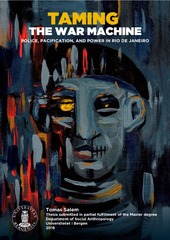| dc.description.abstract | In this thesis I trace the changes in the exercise of Brazilian state power in Rio's poor communities, or favelas, through an ethnographic exploration of the Pacifying Police Units (UPPs) - allegedly a proximity policing initiative that sought to reassert state control in areas previously dominated by drug cartels. The main interlocutors of this thesis are the military police officers and beat cops working at the UPP's. Drawing on their experiences, I analyze (a) recent changes in the policing of the favelas; (b) the violent becomings of beat cops; (c) the enactment of state order in the pacified favelas through patrol practices; and (d) the gendered dynamics of the process of reforming and modernizing the police. Throughout the thesis I draw on Deleuze and Guattari's (1987 [1980]) distinction between war machine and state dynamics, which they describe as two antagonistic and mutually annihilating forces that coexist in all social processes. While they describe war machines as a- hierarchical, a-centered, deterritorialized and heterogeneous horizontal assemblages, dedicated to the destruction of the barriers and structures that impede or direct their movement, states are understood as hierarchizing, territorializing and centralizing assemblages, dedicated to the conservation of organs of power and the regulation and control of movement and action. The framework is particularly well suited to analyze processes of violent conflict between state and non-state subjectivities, such as the police and the populations that they are meant to control, as well as conflicting and contradicting processes within particular state orders. I follow Kapferer and Bertelsen (2009: 2) who argue that the methods and procedures whereby states achieve and legitimate the domains of their control and power are integral to the kind of violence the particular state formation are likely to perpetrate." Thus, I argue that the exercise of violent state power by the Military Police in Rio de Janeiro must be understood as a product of a particular Brazilian state order founded on colonial modes of domination, where war machine dynamics have been, and continue to be intrinsic to the functioning logic of the Brazilian state. I will argue that two opposing processes converge in the pacification project: on the one hand, it is an attempt to reform the military police through the paradigm of proximity policing, and the taming, domestication, or disciplining of the wild masculinities within the police; on the other hand it represents a colonization of the favelas through a military logic that continues to draw on the rhetoric of war on drugs. The incompatibility between the paradigm of proximity policing and the militarized approach of the UPP's expresses what Kapferer and Bertelsen (2009) refer to as the aporia of the state. | en_US |
